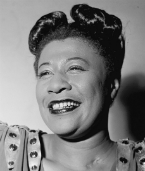
Ella Fitzgerald had an exceptional vocal range that earned her titles like ‘The Queen of Jazz’, ‘The First Lady of Song’ and ‘Lady Ella’. She was held in high esteem by her fans all over the world at the peak of the Swing and Big Band era. Numerous times did she face discrimination because of her African-American roots. But, that did not stop her from achieving respect and musical fame the world over. In fact, she was the first African-American woman to earn a Grammy award. Although other female Jazz vocalists like Billie Holiday or Ivie Anderson and later Sarah Vaughan created quite a stir in those times, Lady Ella had her own territory marked out. And, she was the queen there. But her journey had never been a smooth one. This American icon of music suffered through severe times before she gained the fame she deserved. Let us shed some light on the life of ‘Lady Ella’ or the ‘Queen of Jazz’ as she was popularly known to her fans.
Ella Fitzgerald was born April 25th, 1917 in Virginia. After some time, her mother and stepfather moved to New York City where little Ella grew up with the dream of becoming a dancer. Her early love for music was stirred in church. At the age of 15, young Ella lost her mother in a car accident. She lived with her stepfather for a time before moving in with an aunt who lived in Harlem, and Ella often sang in the street for tips to earn money. Very soon, she dropped out of school and came into trouble with the law as she worked as a runner for local gamblers to earn her bread and butter.
It was in Harlem in 1934 when Ella participated in an amateur talent (equivalent to today’s popular “America’s Got Talent” and similar shows) at the Apollo Theatre, where she won first place. Soon after, Fitzgerald was introduced to bandleader Chick Webb, who was in search of a female vocalist for his band. Webb heard the young Ella sing with a local band and invited her to “test sing” at a dance Webb was playing at Yale University. Following the positive audience response to Fitzgerald at the Yale event, Webb hired her. Because Fitzgerald was still legally underage and as a result could not legally tour with the band, Webb eventually adopted the young orphan.
Fitzgerald found stability in musical success with the Chick Webb Orchestra, performing across the country, but most often associated with the Savoy Ballroom in Harlem. Fitzgerald’s rendition of the nursery rhyme “A-Tisket, A-Tasket” which quickly sold over a million records and helped boost both her and Webb to national fame. Troubles did not leave her trail even during the glorious phase of her career. Her band, which included legends Dizzy Gillespie and Illinois Jacquet, was arrested while on tour in Dallas, Texas because of racial discrimination. “They took us to jail,” Ella later recalled, “and then when we got there, they had the nerve to ask for an autograph.”
After Webb died of spinal tuberculosis his band was renamed ‘Ella & Her Famous Orchestra’, and Fitzgerald took on the role of bandleader. During the time between 1935 and 1942, Fitzgerald recorded nearly 150 songs with Webb’s orchestra. In addition to her career with the Webb organization, Fitzgerald performed and recorded with the Benny Goodman Orchestra. She also had her own side combo, known as ‘Ella Fitzgerald & Her Savoy Eight’. Fitzgerald left the orchestra behind in 1942 to start a solo career that would last the rest of her life.
The musical career of this wonderful Jazz singer spanned a period of more than 50 years from 1934-1991. She gained immense popularity as a Scat singer, recording and selling over 200 albums by the end of 1990. She won a record-breaking total of 13 Grammy awards. Lady Ella had the experience of recording songs with the legends Frank Sinatra and Louis Armstrong in her journey as the Jazz Queen. Nothing could ever stop this lady from singing even when she was taken on by a severe case of Diabetes that eventually blinded her. In March 1990 Ella made one of her last appearances at the Royal Albert Hall in London, England with the Count Basie Orchestra. By 1993, she had to have both of her legs amputated below the knee due to the effects of diabetes. Confined to a wheelchair, she spent her final days at her Beverly Hills home with her son Ray and granddaughter, Alice. She died in her home on June 15, 1996 at the age of 79. Ella Fitzgerald remains an inspiration to many swing lovers of the century.
